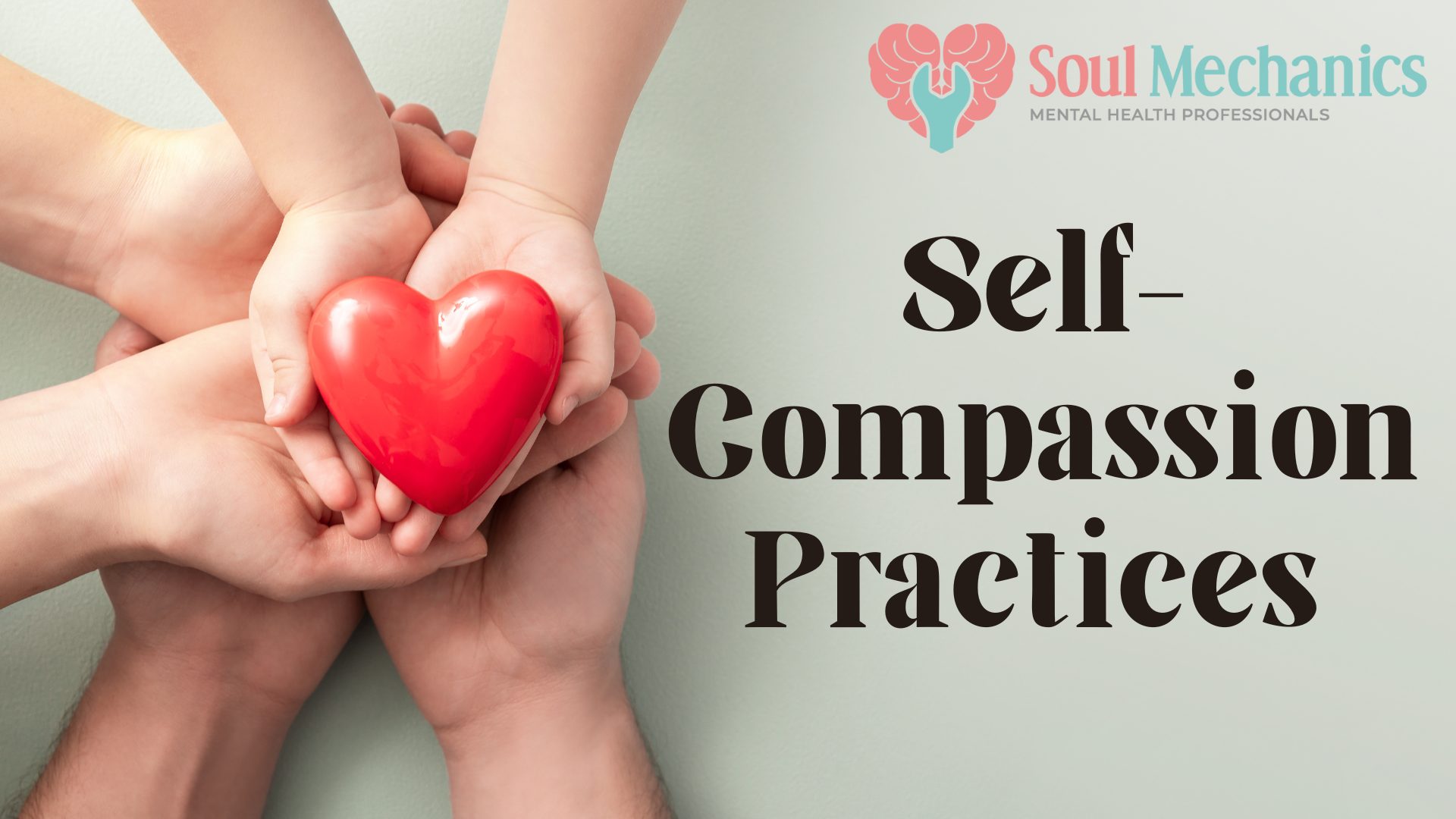Self-Compassion Practices
Self-Compassion Practices
Written By: Shaundtrya Ganasan, Licensed Counselor (KB11097)
Self-compassion is something that many of us struggle with.
We are often moved by others’ suffering compared to our own.
We would rather drown in empathy than tend our wounds.
What are Self-Compassion Practices?

Self-compassion practice is the act of acknowledging and embracing our shortcomings and wounds with kindness; just like how we treat our loved ones who are going through difficult life phases. It is a practice that encompasses mindfulness, self-love, and humanity towards self.
Nevertheless, most of the time we tend to judge and blame our failures, pain, and imperfections. It is easier to dodge it with criticism than to sit with our grief. Many of us avoid listening to what our pain has to say to us.
We wouldn’t dare to even have a glimpse of our wound, rather we would try to seal it as soon as possible. Since these wounds are sealed before healing, they often grow into shadows of self-blaming or self-criticism. You can read more on shadows here Shadow Self: Unveiling Ourselves.
Self-blaming and self-criticism are some common coping measures that many of us opt to avoid dealing with our pain. Blaming and criticizing are often associated with intergenerational trauma response.
If you’re looking for a therapist in Kota Damansara or Ipoh area, you can click here for more information.
Our shortcomings may look unpleasant on a surface level, but deep beneath, it has a lot to share, and wisdom to teach.
Intergenerational Trauma’s Role
Intergenerational trauma often influences the way we respond to our stressors and how we cope with our issues.
Being self-critical could be a cycle that we may be carrying from our previous generations. For instance, we may be growing up witnessing our loved ones blaming themselves for every life obstacle, which may be unknowingly absorbed deep within us. We may be unconsciously following their footsteps as we grow and be engulfed in the cycle of self-blaming.
Self-criticism could also be a trauma response. Let’s say we grow up being constantly invalidated and questioned for our choices and the way we feel emotions. This would lead us to unconsciously shut our emotions and fear vulnerability. We would avoid feeling intense emotions at any cost. We would also be blaming ourselves for every other life's shortcomings.
Intergenerational trauma can gradually turn us into a people pleaser and tend to self-sacrifice for the needs of others; losing our sense of self. We may feel guilty about keeping ourselves as a priority or even self-love as we may have a strong belief that self-love is a selfish act.
Thus, practicing self-compassion also means that we are on the journey of breaking the intergenerational trauma loop. We are on a mission to create healthier patterns to be passed on to the upcoming generations. Seek your therapist to explore the intergenerational trauma that you may be carrying.
Decoding Self-Compassion

You may be wondering what lies within self-compassion. Let us unveil the underlying theme together.
Self-compassion consists of a few significant components:
1. Mindfulness
- Mindfulness is about being in the moment without any sense of judgment. Instead of tangling yourself with self-destructive thoughts, mindfulness allows you to observe your thoughts and listen to what it has to say without feeling overwhelmed.
2. Self-love
- Being kind to ourselves can be a task, especially with the past baggage and regrets that we carry. Self-compassion involves extending some kindness and warmth to ourselves as well. It is also about being nurturing towards self without harshness and self-criticism.
3. Humanity towards self
- We often empathize with others' suffering but tend to be more strict with our struggles. Self-compassion allows us to recognize and validate our own life experiences with humanity instead of pushing them away as irrelevant feelings.
Myths that Surround Self-Compassion Practices
Have you asked yourself?
“Am I too selfish if I prioritize myself?”
“What would they think about me if I said no?”
Many of us could be reluctant to practice self-compassion due to the common myths that surround it.
Here are some common myths regarding self-compassion practices and the facts behind them.
1. Myth: Self-compassion is a self-indulgent act
Fact: Self-compassion is about choosing to understand and give supporting shoulders to ourselves to lean on; reducing self-destructive thoughts and behaviors.
2. Myth: Self-compassion is about not prioritizing others
Fact: Self-compassion is not about pushing away our loved ones, but embracing and caring for ourselves as well for our pain and shortcomings; allowing us to be more present in our relationship with others.
3. Myth: Self-compassion is a sign of weakness
Fact: Self-compassion needs a lot of emotional resilience and strength to face the shadows we’re running away from, to embrace them, and to heal them with kindness.
Self-Compassion Practices

1. Self-Compassion Break
When you find that your thoughts are getting self-critical, take a self-compassion break. Take a moment to acknowledge your inner struggles, or journal your thoughts. Remind yourself that you shall pass this tough phase by being gentle and patient with yourself. Seek your therapist to understand more about self-compassion breaks.
2. Mindfulness Meditation
Make mindfulness meditation a daily routine to be practiced. Get yourself a calm and comfortable space and focus on your breath. You can add some soft music or fragrance if needed to further relax. Gently repeat kind phrases in your mind like “I am embracing the rawest version of me” as you breathe in and out.
3. Gratitude Activities
Practicing gratitude can be a powerful self-compassion tool. Regularly journal the things you are grateful for. Make it a habit to acknowledge your small wins like “getting breaks”, “saying no”, and “being kind to yourself”. This practice creates a sense of self-appreciation and shifts your focus towards the positive aspects of your life.
4. Strength-Based Reflection
Sometimes we tend to be more fixated on our perceived weaknesses rather than celebrating our strengths. Self-compassion practice also involves dedicating time to reflect on the strengths that helped us with our achievements. This practice helps us to recognize our strengths and be more compassionate towards our shortcomings.
5. Set Realistic Expectations
We often over-commit ourselves with self-goals that are tough to attain. Thus, in self-compassion practice, it is crucial to set realistic self-expectations. It is okay to start with small achievable goals. It is also okay if the process does not go as planned. What matters is you embrace yourself with kindness during your lows.
Therapist's Role in Healing
Breaking free from self-blaming or self-criticism can be a tough task, especially when many of us are used to this pattern. Breaking patterns or cycles alone can reduce our motivation levels as this process may get intense, although it’s worth the outcome.
It is not just breaking simple cycles or patterns, it is breaking intergenerational traumas and healing from inner child issues. It needs us to be extra compassionate towards ourselves during the whole process. A therapist would guide you step-by-step with appropriate tools and approaches to becoming a cycle breaker and feeling free from past baggage that tags along.
Thus, it is highly recommended to start your healing journey with a therapist's assistance. A therapist would be providing you with a safe and comfortable space to explore the unexplored at your own pace.
You would be learning to understand your triggers, unhealthy coping, underlying issues, unhealed traumas, and so on with a therapist's assistance. This is the stepping stone of healing; when you understand what is happening behind the unconscious, it will be easier to work on breaking and healing from it.
A therapist would also provide you with specific therapeutic tools to work on based on your issues. These tools can act as an additional resource in your healing process and can be utilized throughout your life.
Among the tools, one of the highly recommended practices to start self-compassion is to journal your thoughts. Journaling gives you a sense of clarity and direction. It also helps you to embrace your feelings and restructure your thoughts more positively.
If you’re looking for a therapist in Kota Damansara or Ipoh area, you can click here for more information.
Self-Compassion Embarks Healing
In short, developing self-compassion is a journey that takes its very own time to master. Along the way, there would be times when the road gets rocky or some obstacles manage to get through you. But what matters is, that you are trying your best to be kind towards yourself.
Enjoy the process of self-healing. Rushing may affect the quality of the outcome. Remember, it is okay to reach out for a therapist's guidance if you have difficulty to start practicing self-compassion. Let us together build a society that embraces self as much as we are compassionate towards others.
If you find this blog helpful, why not broaden the horizon of knowledge by learning about "Self-Love: 7 Ways to Love Yourself"?
You can read the blog here.
For more content related to mental health do follow us on our official Instagram.
“ Kindness is a powerful tool to be spread around and to be infused within.”
Shaundtrya Ganasan, Licensed Counselor (KB11097)

